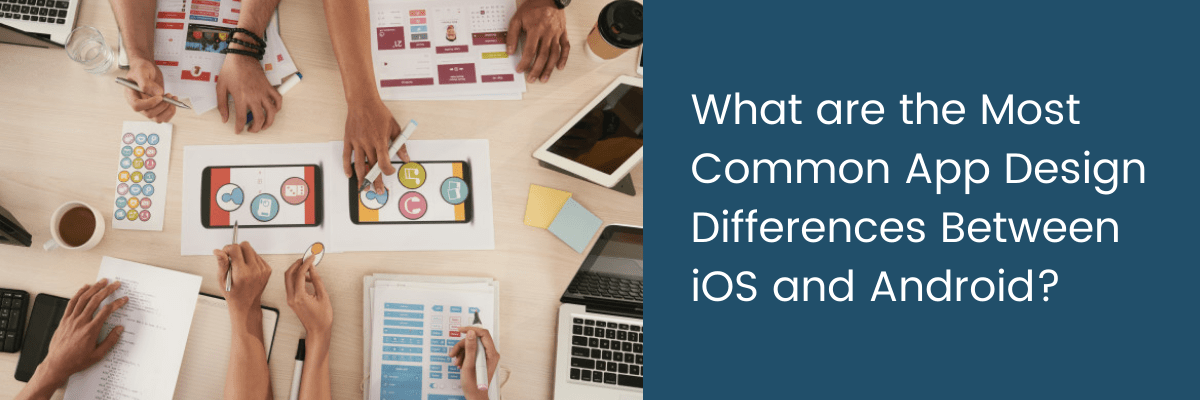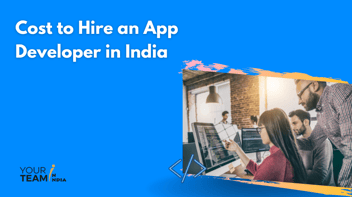How do you determine the importance of Android and iOS App? And, what do you do once you determine that developing an app is the right resolution your brand demands to fix a core business difficulty?
Well, when you start preparing your technical specifications, you need to decide what platform you want to develop on, but how do you determine which platform is right for your product? Android vs iOS: which platform to build your app for first?
With iOS and Android owning 97% of the global mobile market share, the exemplary approach for businesses is to build and launch for both platforms.
However, that’s not always possible – it can be budget draining. To develop an app on both platforms, you need to hire iOS app developers and an Android app development team together.
That can add up an orderly sum of money developing for both OSs at once. Instead, you may want to consider launching on one platform first and then introduce a second platform at a later date.
Each platform has distinguished advantages, so it’s important to do sufficient analysis to know which OS properly aligns with delivering your product goals. Choosing between the two principal players in mobile depends on what characteristics and specs are most important to you.
Once you have listed down characteristics and specs, you must find out development cost, design, markets, monetization models, and ROI expectation differences for iOS and Android apps. Both systems, despite having structural connections, still have different construction and maintenance procedures.
So, it would be fair to say that building apps for both types of operating systems are important.
How to Decide Whether to Launch iOS or Android App?

This generally depends on four main factors;
1. Audience
Certain areas of the world are ruled by iOS while others are majority Android users – Where is your audience? You must study the geographical importance of each platform. Android has more presence in up-and-coming markets such as Latin America, Africa, and Asia.
On the other hand, Western Europe and North America are mainly Apple users. According to a survey, it has been interpreted that Android OS is often used in developing nations, but iOS is typically used in developed nations where people have incomes and can spend money on mobile and apps.
If you’re targeting a global audience, then Android may be the best option. However, if you’re starting an e-commerce or enterprise app then hiring iOS app developers may be ideal. Consider how much disposable income they have to be spending money on mobile and app.
While Androids might have higher downloads, iOS users tend to have higher engagement rates and spend more on iOS apps.
Recommended Read: How to Find Android App Developer
2. Time
Perhaps one of the biggest factors when it comes to selecting between platforms is determining how much time you have to work with. How early do you want to launch your application to the market? It’s essential to note that the longer the mobile app developers take to develop, the greater the costs of development will be.
So, which is better; iOS or Android development? To answer that, it’s generally quicker to build an app for iOS because unlike Android, iOS is not open source. The increased versatility of Android introduces more components, devices, and potential for software fragmentation.
While Android apps are developed using JAVA or Kotlin programming, iOS apps use Objective-C or Swift. Developing an iOS application is far more compelling than developing for Android. If we talk about Android, there is an overabundance of smartphones and tablets running on the Android OS.
This conclusively means you need to develop an app suitable for all of them.
"According to Statista, the number of mobile phone users is expected to cross the 5 billion mark by 2019"
3. Features
What features will you offer through your business app? If you are developing for Android or iOS, keep the functionality in mind. Because Android is open-source, there’s more flexibility to customize your app which allows building the features and functions that your audience wants.
The downside to this is that Android is much more sensitive to attacks due to being open source. Apple is more reliable, due to its closed nature, which is principally why iOS has a wider audience in the enterprise market. So if you’re looking to take payments or other vital information via your app, then iOS may be the safer choice.
Everyone has unique business fundamentals, while there might be some who would want to build PWA (Progressive Web Apps) while creating their app. So there is no single-app development platform that fits all. To make the most suitable judgment, it is important to understand deeply the details of each platform and comprehend the features and limitations completely.
4. Budget
The cost of mobile app development depends upon the extent and complexity of the project. The more extensive and more involved in the project is, the greater the budget will need to be. There is nothing fixed in iOS- and Android app development that makes one more expensive than others.
There’s no gainsaying that it is cheaper to develop an app for iOS. In fact, it can be 30-40% cheaper than building an app for Android. The main reason for such a price difference is that Apple is simpler to develop because of the code; Android apps are typically written in Java which involves more writing compared to Apple’s coding language which is Swift.
Many small companies use in-house Android and iOS developers to cut down app-building costs, but hiring a mobile app development company can help you develop an app under a limited budget and time.
Once you have streamlined and chosen which side you want to be at, consider the basic app design differences as well to make your decision fail-safe.
What are the Most Common App Design Differences Between iOS and Android?

Android app development vs iOS is circumscribed by design guideline systems that define the look and feel of apps. Android adheres to Material Design, the iOS’ developer guide book will be the Human Interface Guidelines.
For Apple, the content of the app has priority over design. As a result, accuracy and the extensive use of white space are desirable. The most common tools used by UI designers are adumbrations and gradients. All in all, the application’s design should convey a sense of intensity and be multi-layered.
Android designs come from real-world inspiration. As a result, vitality and motion are two defining factors. Android designers usually work with a wider range of tools - light, motions, color changes.
Needless to say, it’s up to a creator to determine a look-and-feel for the app. However, several system-specific differences influence the design of iOS and Android apps development.
1. Three Buttons vs One
Android devices have three buttons - back, overview, and home whereas Apple smartphones only have the home button. As a result, iOS developers need to develop the app with precision ensuring that there are in-built features for the users to return to the previous screen.
For Android developers, such a feature is discretionary. However, starting with Android 9.0., iOS-style gesture navigations will be adopted as well. In the future, 3-button devices are likely to replace with one gesture-operated button altogether.
Many iPhone users are considerably enamored of the tactical sensations provided by the button as well. iOS takes the triumph on this one.
2. Primary Navigation Destination
On iOS apps, primary destinations in the app are listed as tabs across the bottom.
- There are 2-5 tabs total
- They are identified in size 10 font
- They outline the main destinations of the application
With Android vs iOS development, the biggest difference in Android apps is that the same primary destinations are more spread out throughout the interface – often between;
- a hamburger button
- a search bar
- tabs, or
- a floating action button
The navigation bar placement is a noteworthy detail. On iOS devices, it’s centered while, on Android phones, the bar is aligned to the left. Mobile app developers usually use the navigation bar to write the name of the screen.
There's no definite rule as to which navigation bar placement is superior in terms of user experience.
3. Widget Assistance
Android devices widely maintain widgets on their home screen (except for the lock screen). iOS is reasonably new to the course of widgets - as a consequence, it provides inadequate widget support. A user will only be able to reach widgets in the Notification Center.
By widget assistance, Android devices win over iOS as they have fully adopted the feature and use its privileges much more largely. So how should one really develop a successful Android application?
4. Device Fragmentation
We have by now incorporated the indications of Android device fragmentation when it comes to testing and development. As a result, when you hire android programmers, they have to reserve from devising comprehensive application interfaces as they will be notably slow on low-end Android devices.
The difference in screen dimensions makes setting proportions and design elements
optimization more challenging and time-consuming as well.
Device fragmentation makes designing for Android a pain in the neck. That’s why the interface of an Android app will cost more and take a long while to make compared to iOS designs.
Final Decision
When contemplating iOS or Android app development, consider the advantages and disadvantages of both platforms. You should base your decision on your budget, business idea, marketing time, and other factors we have discussed in this article.
Calculating the amount of time and workforce needed to create apps for either OS as well as calculating maintenance risks is crucial for the project’s success.
To simplify, you need to choose iOS app development in the following cases:
- You want to produce tremendous revenue per user
- For a less complex development process
- Your preferences are user information protection and secrecy
At the same time, hiring Android developers would be the best alternative:
- If you want to attain a more extensive audience
- Short waiting time to get the app to the Store
- You want to customize the app
Now that you have decided, the last thing left is to hire an app development company. Developing an app on your own is challenging - that’s why it’s better to have a professional team to rely on.
Finally, your ultimate decision will depend upon what exactly works for your business.






